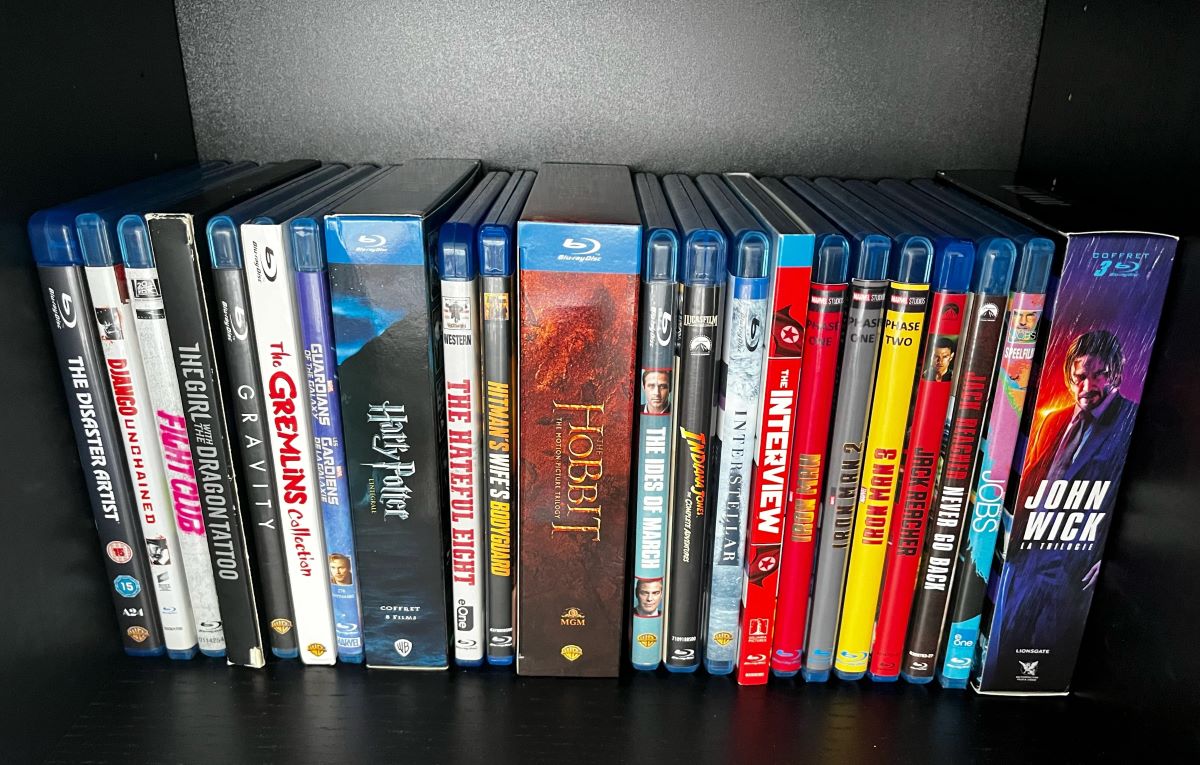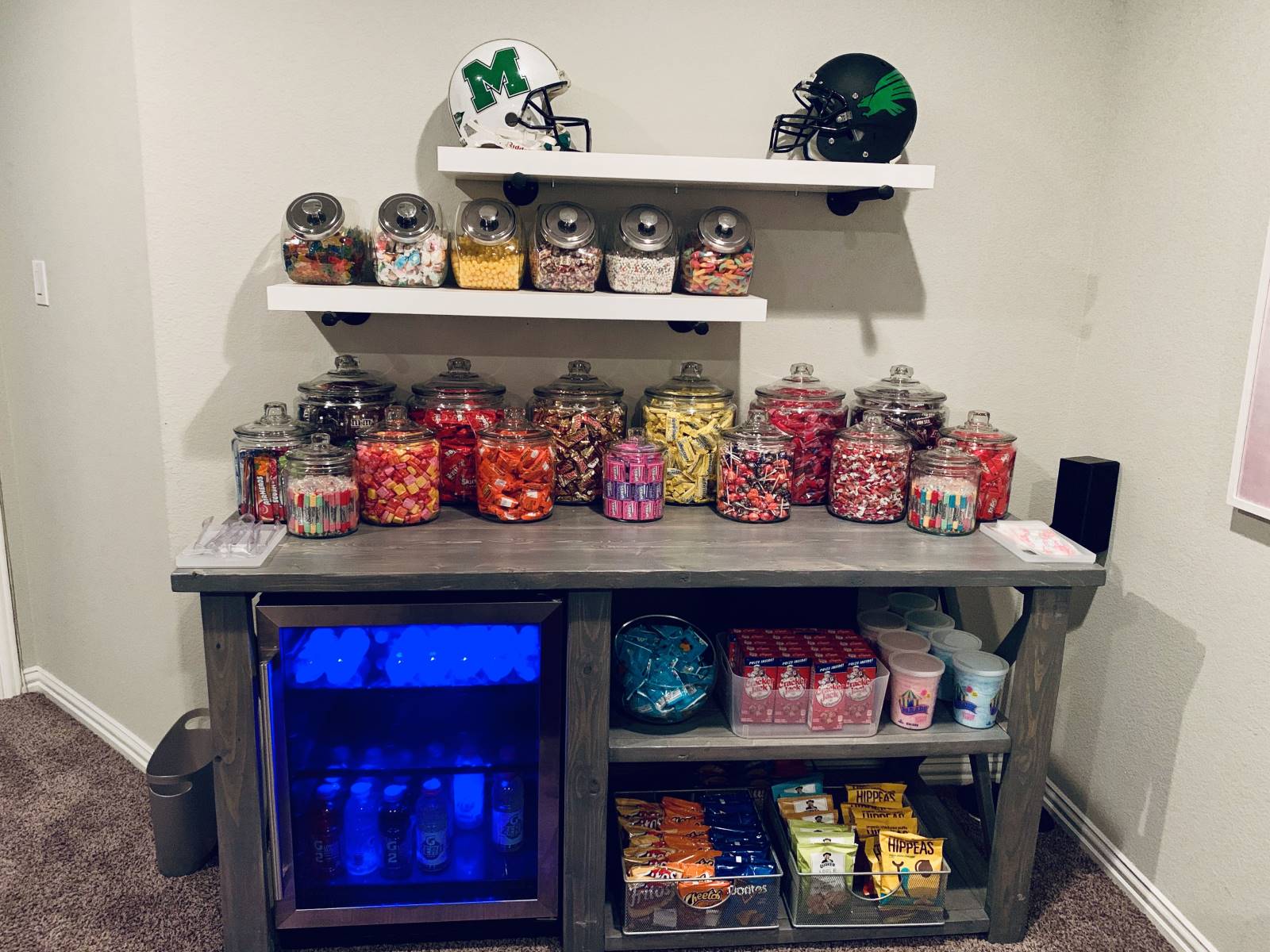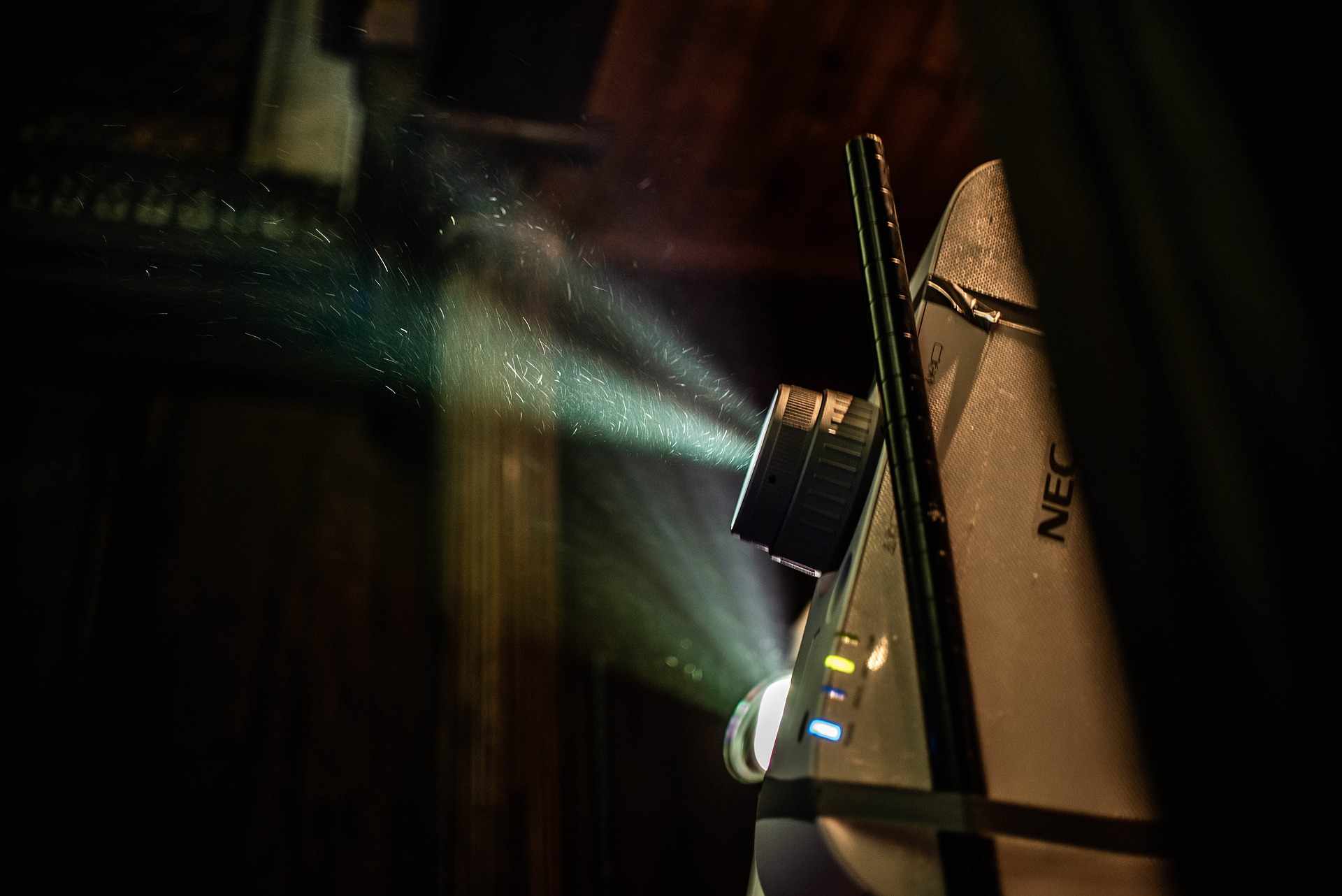

Articles
How To Store Movies
Modified: January 5, 2024
Learn the best methods for storing and organizing your movie collection with helpful articles on how to store movies and protect them for years to come.
(Many of the links in this article redirect to a specific reviewed product. Your purchase of these products through affiliate links helps to generate commission for Storables.com, at no extra cost. Learn more)
Introduction
With the rise of digital media, the way we store movies has dramatically changed over the years. Gone are the days of bulky VHS tapes and DVD collections taking up valuable space in our homes. Now, we have a plethora of options for storing movies, both physically and digitally.
In this article, we will explore the various options available for storing movies, including physical storage options like Blu-ray discs and DVD cases, as well as digital storage options such as external hard drives and cloud storage. We will also provide tips on how to choose the right storage option for your needs and offer advice on how to properly organize and care for your movie collection.
Whether you’re a movie enthusiast with an extensive collection or simply someone who wants to ensure their favorite films are safe and easily accessible, this article will guide you through the process of storing movies effectively.
Key Takeaways:
- Choose the right storage option based on your collection size, convenience needs, and budget. Whether you prefer physical or digital storage, proper organization and maintenance are key to preserving your movie collection for years to come.
- Organize your movie collection effectively by genre, alphabetical order, or using digital tools for easy access. Implement proper storage practices, such as keeping movies in a cool, dry environment and handling them with clean hands, to ensure the longevity and quality of your collection.
Read more: How To Watch Movies On A Projector
Options for Movie Storage
When it comes to storing movies, there are several options to consider. Depending on your preferences and needs, you can choose between physical and digital storage methods. Let’s take a closer look at each option:
Physical Storage Options
Physical storage options involve storing movies on physical media, such as Blu-ray discs, DVDs, or even VHS tapes for those nostalgic collectors. Here are some popular physical storage options:
- Blu-ray Discs/DVDs: Blu-ray discs and DVDs are a popular choice for movie collectors. They provide high-quality video and audio and come in various storage capacities, such as single discs or multi-disc sets.
- DVD Cases: If you have a large DVD collection, investing in DVD cases can help save space and keep your movies organized. These cases allow you to store multiple discs in a compact and easily accessible manner.
- Media Cabinets/Shelves: Media cabinets or shelves are ideal for those with a substantial physical movie collection. These furniture pieces are designed specifically to store and display your movies, making it easy to browse and select the one you want to watch.
Digital Storage Options
Digital storage options have become increasingly popular due to their convenience and flexibility. Here are some digital storage options for storing movies:
- External Hard Drives: External hard drives offer a convenient way to store a large number of movies, especially if you prefer to have your collection with you wherever you go. These devices come in various storage capacities and can be easily connected to your computer or media player.
- Cloud Storage: Cloud storage allows you to store your movies on remote servers, accessible from any device with an internet connection. Services like Google Drive, Dropbox, and iCloud provide secure and reliable options for storing your movie collection in the cloud.
- Streaming Services: If you prefer not to store physical or digital copies of movies, streaming services like Netflix, Amazon Prime Video, and Disney+ provide a vast library of movies that you can access instantly. These services allow you to stream movies directly over the internet without the need for physical or digital storage.
It’s worth noting that digital storage options offer the advantage of easy accessibility and portability. You can access your movie collection from multiple devices and enjoy your favorite films anywhere, anytime. However, some movie enthusiasts still appreciate the tangible experience of physical media and enjoy the process of collecting and displaying their movies in their physical form.
Physical Storage Options
Physical storage options are a traditional but still popular choice for movie collectors who enjoy the tactile experience of physical media. Here are some common physical storage options:
- Blu-ray Discs/DVDs: Blu-ray discs and DVDs have long been the standard for physical movie storage. These discs offer high-quality video and audio and are compatible with most DVD or Blu-ray players. They come in various storage capacities, from single discs to multi-disc sets, making them suitable for storing both individual movies and box sets of TV series.
- DVD Cases: DVD cases are an excellent option for those with extensive DVD collections. Instead of keeping movies in their original DVD packaging, you can transfer the discs to DVD cases to save space and keep them organized. These cases often come with inserts that allow you to display artwork and information about each movie.
- Media Cabinets/Shelves: For movie collectors who prefer the aesthetic appeal of physical media, media cabinets or shelves are a great choice. These furniture pieces are specifically designed to store and display movies. You can find cabinets with adjustable shelves to accommodate movies of different sizes and formats. Plus, some cabinets even have glass doors to protect your collection from dust and damage.
- Movie Binders: Movie binders are a compact and portable option for storing movies. They are essentially large albums with plastic sleeves that allow you to slide your DVDs or Blu-ray discs into them. Movie binders are ideal for individuals who want to save space or need a portable solution for taking their movies on the go.
- Specialty Cases: There are also specialty cases available for storing specific types of movies, such as steelbook cases for collectors who prefer limited edition or collector’s edition movies. These cases often feature unique artwork and designs, adding a touch of elegance to your movie collection.
When it comes to physical storage options, it’s important to consider factors such as available space, ease of access, and organization. You may want to assess your collection size and storage needs before deciding on a specific option. Additionally, proper care and maintenance are crucial to ensure the longevity of your physical movie collection. Keep your discs in a cool, dry place, away from direct sunlight, and handle them with clean hands to prevent scratches and damage.
While physical storage options offer the joy of owning a tangible collection, they can also take up space and require proper organization to locate specific movies easily. If you prefer a more streamlined and space-efficient approach, digital storage options might be more suitable for your needs.
Digital Storage Options
Digital storage options have revolutionized the way we store and access movies. They offer convenience, portability, and the ability to store a large number of films without taking up physical space. Here are some popular digital storage options for movies:
- External Hard Drives: External hard drives provide a reliable and spacious solution for storing your movie collection. With storage capacities ranging from a few hundred gigabytes to several terabytes, you can store thousands of movies on a single device. Simply connect the external hard drive to your computer or media player, and you can easily access and play your movies.
- Cloud Storage: Cloud storage services like Google Drive, Dropbox, and iCloud offer a convenient and secure way to store and access your movie collection from anywhere with an internet connection. You can upload your movies to the cloud and access them on multiple devices such as smartphones, tablets, or computers. This option is particularly useful if you want to free up storage space on your devices.
- Media Servers: Media servers allow you to create your own personal movie streaming service within your home network. With a media server, you can store your movie collection on a central server and stream them to various devices, such as smart TVs, gaming consoles, or media players, within your home. Popular media server software includes Plex and Emby.
- Online Movie Libraries: Some online platforms offer comprehensive movie libraries where you can purchase or rent digital copies of movies. Services like Amazon Prime Video, Google Play Movies & TV, and iTunes allow you to digitally buy or rent movies and stream them directly to your devices. Although you don’t physically own the movies, your purchased copies are stored in your digital library on these platforms.
- Streaming Services: Streaming services like Netflix, Amazon Prime Video, and Disney+ have become increasingly popular as they provide instant access to a vast library of movies without the need for physical or digital storage. These services require a subscription, but they offer a wide range of movies and TV shows that you can stream on-demand on various devices.
When considering digital storage options, it’s important to ensure that you have adequate storage capacity and a secure backup system. Regardless of the option you choose, it is recommended to keep backups of your digital movie collection to prevent data loss in case of hardware failure or accidental deletion.
One of the benefits of digital storage options is the ability to easily organize and search for movies by genre, director, or actor. Many digital storage solutions offer software or apps that automatically download movie metadata, including cover art, plot summaries, and cast information, making it easier to browse and select movies from your collection.
While digital storage provides convenience and accessibility, it’s essential to consider factors such as internet speed, streaming quality, and the availability of your favorite movies on the streaming platforms before deciding on a digital storage option that best suits your needs.
Choosing the Right Storage Option
When it comes to choosing the right storage option for your movie collection, there are several factors to consider. Each option has its advantages and disadvantages, so it’s important to assess your needs and preferences before making a decision. Here are some key factors to consider when choosing the right storage option:
Collection Size:
Determine the size of your movie collection. If you have a vast collection with hundreds or even thousands of movies, digital storage options like external hard drives or cloud storage may offer the necessary capacity. For smaller collections, physical storage options like DVD cases or media cabinets may be more suitable.
Convenience and Accessibility:
Consider how easily and quickly you want to access your movies. Digital storage options provide instant access to your collection, allowing you to stream or download movies whenever you want. Physical storage options may require more time to locate and physically handle discs.
Portability:
If you want to take your movie collection on the go, digital storage options like external hard drives or cloud storage are ideal. They allow you to access your movies from any device with an internet connection. Physical storage options may be less portable, requiring manual transport of discs.
Tactile Experience:
Some movie enthusiasts enjoy the tactile experience of physical media, such as holding a Blu-ray disc or browsing through a DVD case. If you appreciate the physical aspect of collecting movies, physical storage options may be more satisfying for you.
Cost:
Consider your budget. Digital storage options often incur upfront costs for hard drives or cloud storage subscriptions. Streaming services require ongoing subscription fees. Physical storage options may involve purchasing DVD cases, media cabinets, or individual movie discs. Evaluate the costs associated with each option and choose the one that aligns with your budget.
Future Proofing:
Think about the longevity and future-proofing of your storage option. Physical media can degrade over time, and there is always the risk of scratches or damage. Digital storage options offer the advantage of backups and easy migration to newer storage technologies.
Ultimately, the right storage option depends on your personal preferences, collection size, convenience requirements, and budget. You may even choose to use a combination of different storage options, such as storing your most frequently accessed movies digitally while keeping cherished favorites in physical form. Consider your needs and weigh the pros and cons of each option to find the storage solution that best suits you.
Read more: How To Set Up Outdoor Movie Night
Organizing Your Movie Collection
Once you’ve decided on a storage option, it’s essential to organize your movie collection effectively. A well-organized collection makes it easier to find and enjoy your favorite movies. Here are some tips for organizing your movie collection:
1. Sort by Genre:
One popular way to organize movies is by genre. You can categorize movies into genres such as action, comedy, romance, sci-fi, or horror. This makes it convenient to locate movies based on your mood or preference.
2. Alphabetical Order:
An alphabetical order is a classic method of organizing movies. Arrange your collection alphabetically by movie title or by the names of directors or actors. This helps you quickly locate specific movies and provides a systematic approach for future additions.
3. Numbering System:
If you have a large movie collection, consider implementing a numbering system. Assign unique numbers to each movie and create a corresponding database or spreadsheet to keep track of the movie titles and their corresponding numbers. This system simplifies the process of locating movies and can be particularly useful for collections that span multiple storage media.
Read more: How To Design A Cozy Family Movie Room
4. Date of Release or Chronological Order:
If you’re a movie buff or collector, organizing movies by their release dates or in chronological order can be intriguing. This arrangement allows you to trace the evolution of a particular genre or follow the filmography of a specific director or actor.
5. Personal Rating or Favorites:
If you want to highlight your favorite movies or keep track of your personal ratings, consider creating a separate section within your collection. You can mark them with labels, stickers, or place them in a designated area for easy access.
6. Digital Organization:
If you opt for digital storage options, take advantage of the software and apps available for organizing your digital movie collection. These tools can automatically download metadata, cover art, and other details, making it visually appealing and easier to browse through your digital library.
7. Maintenance and Updates:
Regularly update and maintain your movie collection. Remove duplicates, discard damaged or unwanted movies, and keep your collection clean and dust-free. It’s also a good idea to periodically review and update your organization system as your collection grows or your preferences change.
Remember, the key to organizing your movie collection is to find a method that works best for you and aligns with your personal preferences. Whether it’s arranging them by genre, alphabet, or using a digital organization tool, a well-organized collection enhances your movie-watching experience and ensures that you can easily locate the movies you want to watch.
Read more: What To Use For Outdoor Movie Screen
Tips for Proper Movie Storage
Proper movie storage is crucial to ensure the longevity and quality of your movie collection. Here are some tips to help you store your movies properly:
1. Keep Them in a Cool and Dry Environment:
Avoid storing movies in areas that are exposed to extreme temperatures or high humidity, as they can damage the discs or cause warping. Instead, choose a cool and dry location, away from direct sunlight and sources of moisture.
2. Handle with Clean Hands:
Before handling movies or inserting them into players, make sure your hands are clean and free from dirt, oil, or residue. Even small particles can cause scratches on the disc surface, affecting playback quality.
3. Store Discs Vertically:
When storing movies in cases or cabinets, keep them in an upright position, with the label side facing outward. Storing discs vertically helps prevent warping and minimizes the risk of scratches.
Read more: Creating A Cozy Outdoor Movie Night Setup
4. Use Protective Sleeves or Cases:
Consider using protective sleeves or cases to further safeguard your movie discs. These protective covers provide an extra layer of protection against scratches, dust, and other potential damages.
5. Avoid Stacking:
Avoid stacking movies on top of each other, as excessive pressure can cause scratches or cracks on the discs. If you’re using media cabinets or shelves, ensure that there is enough space between each disc to prevent any damage.
6. Back Up Your Digital Collection:
If you have a digital movie collection stored on external hard drives or in the cloud, it’s crucial to regularly back up your collection. This backup ensures that you don’t lose your movies in the event of hardware failure or accidental deletion.
7. Perform Regular Maintenance:
Periodically inspect your physical movie collection for any signs of damage, such as scratches or discoloration. Clean the discs with a soft, lint-free cloth if needed, and repair or replace damaged cases or sleeves. For digital collections, update your software and maintain proper file organization to ensure easy access and playback.
8. Protect Against Theft or Loss:
Consider taking measures to protect your movie collection from theft or loss. For physical collections, consider installing home security systems or locks on cabinets or drawers. For digital collections, ensure that your online accounts have strong passwords and implement additional security measures like two-factor authentication.
By following these tips, you can help preserve the quality and lifespan of your movie collection, whether it’s physical or digital. Proper storage and maintenance ensure that you can enjoy your favorite movies for years to come, without the worry of damage or loss.
Conclusion
Storing movies is an important aspect of being a movie lover or collector. Whether you prefer physical storage options like Blu-ray discs and DVD cases or digital storage solutions like external hard drives and cloud storage, finding the right storage option is essential for preserving your movie collection and ensuring easy access to your favorite films.
Physical storage options offer the tangible experience of owning a physical collection, while digital storage options provide convenience, portability, and the ability to access your movies from anywhere with an internet connection. Each option has its own advantages and considerations, and the choice ultimately depends on your personal preferences, collection size, and budget.
Once you’ve chosen a storage option, it’s important to properly organize and maintain your movie collection. Whether you organize by genre, alphabetical order, or using a digital organization tool, a well-organized collection makes it easier to find and enjoy your movies. Implementing proper storage practices, such as keeping movies in a cool and dry environment, handling them with clean hands, and using protective sleeves or cases, helps ensure the longevity and quality of your movie collection.
Remember to regularly back up your digital collection and perform maintenance tasks to ensure optimal playback and access. Take the necessary precautions to protect your movie collection from theft or loss, whether it’s through physical security measures for physical collections or implementing strong passwords and security measures for digital collections.
In conclusion, choosing the right storage option, organizing your collection effectively, and following proper storage practices are all essential for preserving, accessing, and enjoying your movie collection for years to come. Whether you’re a casual movie viewer or a dedicated collector, taking the time to store and care for your movies ensures that your favorite films are always at your fingertips, ready to be enjoyed whenever the movie-watching mood strikes.
Frequently Asked Questions about How To Store Movies
Was this page helpful?
At Storables.com, we guarantee accurate and reliable information. Our content, validated by Expert Board Contributors, is crafted following stringent Editorial Policies. We're committed to providing you with well-researched, expert-backed insights for all your informational needs.









0 thoughts on “How To Store Movies”